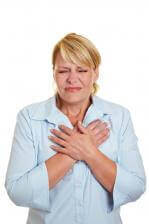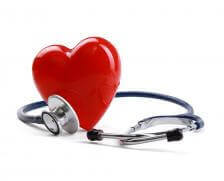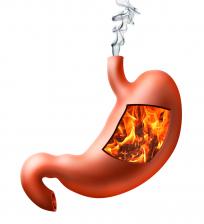When Is Chest Pain Something Else?
Chest pain is common…and complex. How do you know when it’s serious (and when it’s not)? House Call Doctor is on the case.

Chest pain can be complex, with a seemingly endless list of causes. To get to the root cause of chest pain usually requires lengthy questioning by your doctor, along with a solid physical exam and very likely tests.
Most people just want to know if what they are experiencing is something serious. Is it something that can wait, or will it render you with one foot in the grave if you don’t call 911 now? This one symptom causes more alarm than any other, for understandable reasons – heart disease is the number one killer of men and women in the United States. Chest pain is the classic symptom of a heart attack. Who wants to risk that?
In order to illustrate what truly goes through my mind as a doctor when evaluating a patient with chest pain, let’s follow the story of a patient named Chelsea, a 39-year-old woman who comes to see me in the clinic.
The Patient History
I want to know everything about Chelsea’s chest pain…down to the nitty gritty. That means I need to review not only her medical history and diagnoses in her chart, but also her current symptoms and details. After all, chest pain is something most doctors take very seriously – I want to know as much as I possibly can about Chelsea’s symptoms.
I’ve known Chelsea as a patient for 4 years now. She’s a young woman with a thyroid disorder that is under control with medication. She is also somewhat overweight, with a BMI of 27. Otherwise, she’s healthy. But given her symptoms, I want to isolate her risk factors for heart disease, even though she’s only 39. So I ask Chelease the following questions:
-
Is she a smoker or has ever been? (No)
-
Does she have diabetes? (No)
-
Does she have high blood pressure, or hypertension? (No)
-
Is there early first degree family history of heart disease – meaning do her parents or siblings have heart disease? (No, only her grandfather who had a stroke at age 92)
-
Does she have high cholesterol? (It was mildly elevated at her last blood test but nothing that necessitated medication)
As mentioned before, Chelsea is overweight and lives a rather sedentary life as a computer programmer and young mother of 3 children. She has a difficult time maintaining a fitness regimen and as a result has put on about 20 pounds of weight in the last 2 years.
The Current Symptoms
When discussing Chelsea’s chest pain, she reveals that she’s been experiencing this pain for about 2 weeks. Here’s what I need to know and what I discern from our conversation. There’s a useful mneumonic that doctors follow when evaluating chest pain. It’s called PQRST:
-
P (Provocation): Did the pain happen at rest or during exertion? For Chelsea, sleeping seems to provoke or trigger the pain.
-
Q (Quality of pain): Is it an ache, burning, sharpness, or a sense of pressure? How is the quality of the pain described? Chelsea describes her as an “ache.”
-
R (Region of location and radiation): Where is the pain located? Is it right in the center of the chest? Or on one side? For Chelsea there is no radiation of pain to the jaw, shoulder, and/or left arm as in the “classic” type of chest pain caused by a low blood supply to the heart.
-
S (Severity): How severe is the pain? Some doctors will ask you to rate the pain on a scale from 1 to 10, with 10 being the worst pain in the world you can possibly imagine. Chelsea’s pain is moderate, about 6 out of 10.
-
T (Timing): When does it occur and for how long? For Chelsea, it happens every night at bedtime for the past 2 weeks and lasts an hour.
I also want to know:
-
Does anything make the pain better or worse? Chelsea does notice that it’s sometimes worse when she’s lying down, since it seems to be triggered by sleep.
-
Does she have any associated symptoms? Chelsea says she feels a bit of nausea, but other than that there is no shortness of breath, no breaking out into a sweat, and no heart palpitations.
The Physical Exam
It’s important to evaluate chest pain in person – not only because of the numerous questions doctors need answers to before determining possible causes, but also because it’s really important to examine the heart, lungs, and abdomen to get more information.
Chelsea’s heart sounds normal, as do her lungs. But she does have some very mild tenderness when I press on her upper abdomen/lower chest regions.
Tests

She is a healthy young patient without many risk factors for heart disease, with the exception of being slightly overweight. The pain she describes sounds atypical for heart causes of chest pain (although women can present atypically, so I still don’t ignore this as a potential possibility).
I determine that it’s worthwhile to do an EKG (electrocardiogram) in the office, which comes back normal. I also do a blood test to rule out for some other possible causes of chest pain. These include anemia, electrolyte imbalances, a thyroid malfunction (especially since she has a thyroid issue already), cholesterol and sugar levels.
Differential Diagnosis
The most common possible causes of Chelsea’s chest pain are:
- Heart: Understandably, heart causes of chest pain are the most worrying. Typical chest pain that is related to the heart begins in the middle or left side of the chest, can radiate up to the jaw, neck, or down the arm, can be accompanied by nausea, vomiting, heart palpitations, or the sweats, and occurs with exertion and is relieved by rest. But it’s important to note that some patients can present atypically, especially women, those with long-standing diabetes, and the elderly. Therefore, for those aged 40 or older, and especially those with risk factors, it’s important to consider the heart when faced with a chief complaint of chest pain.
As a note, heart attacks in patients under age 40 are not common – unless there is cocaine or methamphetamine use involved.
Also, other anatomical changes can cause chest pain as well – such as structural heart valve abnormalities and problems with the aorta (the big blood vessel attached to the heart) – as can inflammation or infection of the heart (called myocarditis) or the inflammation of the lining of the heart (called pericarditis).
-
Lungs: The lungs are very close in proximity to the heart and therefore symptoms can overlap or mimic each other. Thankfully, Chelsea has never been a smoker and also isn’t experiencing any problems with her breathing which would make me think of possible lung causes. Here are a few lung problems that can also cause chest pain:
-
Pulmonary Emboli: This is a clot in the lung that typically travels from the leg. It occurs in those with a personal or family history of clotting disorders, or in patients with recent history of inactivity (like after hip or leg surgery, or recent travel on an airplane). This typically causes a sudden onset of symptoms, often includes shortness of breath, and usually symptoms don’t just come and go. Some patients also report a swelling in one leg, along with pain. This doesn’t sound like Chelsea’s situation at all.
-
Pneumothorax: This is a hole in the lung that is often caused by trauma (but can also be spontaneous). Again, this is also typically sudden in onset and doesn’t just come and go. It tends to be more severe and is also associated with shortness of breath. This also doesn’t sound like Chelsea.
-
Pneumonia: Patients with pneumonia can have chest pain, but they often also report fevers, chills, cough, and overall malaise. Chelsea’s chest pain doesn’t seem infectious.
-
-
Stomach: The stomach sits right below the chest and is connected to the esophagus (the tube that carries food down from the mouth into the stomach). Therefore, patients who experience acid reflux often report feeling chest pain as well. Upon further questioning, Chelsea tells me that she hasn’t tried taking any antacids to see if that relieves her chest pains at nights. But she says she doesn’t sense any acid reflux. She does all of a sudden remember, however, that her pain seems to also be triggered by heavy foods, like pizza and fettuccini alfredo. She’s also found herself avoiding caffeine while at work the past few months because of some intermittent heartburn.
-
Musculoskeletal: The rib cage, muscles, and nerves all encase the heart and lungs. And when doing heavy lifting or strenuous movement with our upper bodies, we can strain these areas. Patients will often report chest pain and the pain is said to be “reproducible” (meaning we can trigger it) by touching the area or doing certain movements. Some patients will say that it hurts more when they take a deep breath as well. Chelsea’s pain is not reproducible by the touch or triggered with deep breaths and she hasn’t been doing anything strenuous.
-
Anxiety: Anxiety and stress can certainly cause chest pain in some patients. Patients who experience panic attacks, often feel chest pain as a symptom, along with shortness of breath, sweating, heart racing, and a feeling of intense “impending doom.” This is particularly a concern in young people with chest pain, because panic attacks often begin when young.
The Diagnosis

What Chelsea had all along was some acid reflux. Once that was treated, along with some lifestyle modifications (including changes in her diet), her chest pain was completely resolved. This experience made her realize that she really needs to start taking care of herself.
Make sure to listen to my episode on the 5 Tips to Prevent Acid Reflux to learn the exact nutrition and lifestyle changes I discussed with Chelsea to get rid of her chest pain for good.
Share your ideas and learn more quick and dirty tips with us on the House Call Doctor’s Facebook and Twitter pages! You can even find me on Pinterest!
Please note that all content here is strictly for informational purposes only. This content does not substitute any medical advice, and does not replace any medical judgment or reasoning by your own personal health provider. Please always seek a licensed physician in your area regarding all health related questions and issues.


 P (Provocation): Did the pain happen at rest or during exertion? For Chelsea, sleeping seems to provoke or trigger the pain.
P (Provocation): Did the pain happen at rest or during exertion? For Chelsea, sleeping seems to provoke or trigger the pain.



